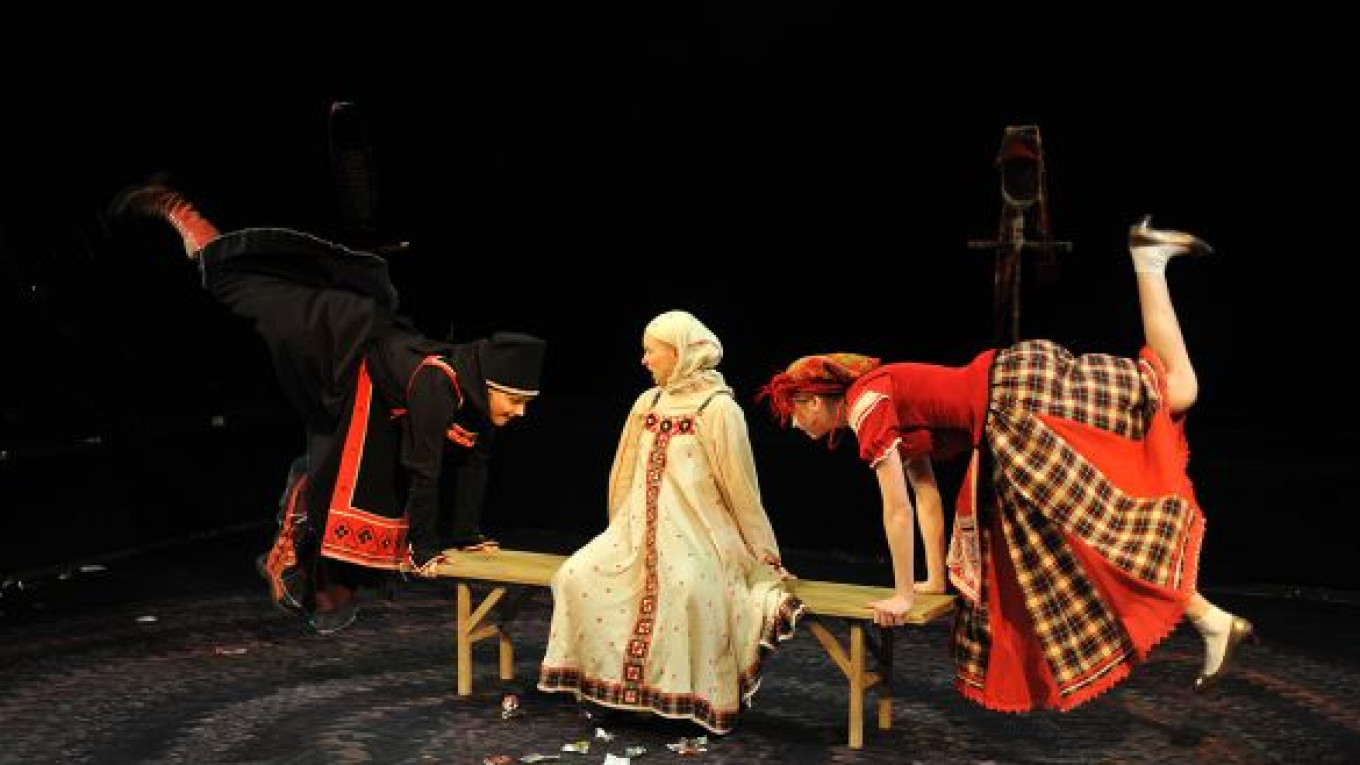There is no way I will satisfactorily translate "Zaklikukhi," the title of a new production playing on the small stage of the Satirikon Theater.
I have consulted dictionaries, encyclopedias, several Russian writers and a Russian actress. And yes, I also checked the internet. Multitran.ru, that colossus of translation sites, doesn't have the word at all. We are told that this production is based on tales, songs, chants, sayings and spells collected by the great folklorist Vladimir Dal in the 19th century, but Dal's famous four-volume dictionary does not mention the word.
To cut a long story short, thanks to a collective effort made among friends, colleagues and technological tools, I came to the conclusion that "Incantations" might do the trick. But when you've seen "Zaklikukhi" performed by the wonderful cast at the Satirikon, you won't want to settle for anything less than the real thing. "Zaklikukhi" it is, then.
Director Svetlana Svirko designates the show's genre as folk-clownery, and that's a pretty accurate description. Three actresses dressed in traditional Slavic costumes designed by Darya Mukhina run through an hour and a half of fun, songs and nonsense drawn from the deep well of Russian and Ukrainian folk wisdom, folk rites and folk humor. There probably are other national traditions mixed in, but there are limits to any individual's knowledge and I have run up against mine.
"Zaklikukhi" does not tell a story but rather dips into dozens of them for a few brief moments at a time. There are several recurring "characters," if you will — cheating husbands and wives, the dead and dying, devils, angels and hobgoblins. Their tales are told through songs or brief skits acted out by the three performers, but what we really find ourselves following are the manic actors themselves.
Polina Raikina is the woman dressed in black. Yevgenia Abramova is dressed in white and Polina Shanina is the woman in red. Each has a distinct personality and a distinct way of relating to the others.
Abramova, with her red nose and protruding red ears, is the biggest clown of them all. She is the dumbest, the most gullible, the most energetic and the quickest one to smile. She is the one who falls so easily into a reverie that her mouth drops open without her realizing it. It's down to the other women to keep her mouth shut, presumably, to keep flies from flying into it.
The bright red-clad Shanina is the coquettish type. She shows off her shapely legs whenever she gets the chance, checks her makeup in a pocket mirror, and makes eyes at the men in the audience.
I should say right here that this show could not happen without the audience. Spectators are encouraged to help the women out when they forget things. They are asked to demonstrate things the women are trying to do without success. One man finds himself with all three women in his lap, and a few folks get colorful rugs thrown at them early on.
Raikina, outfitted in a black costume that appears to be styled loosely on the raiments of an Orthodox priest, is the most menacing and ironic of the trio. With a bit of a wicked smile dancing in the corners of her eyes, she always looks like she's ready to pull a fast one on somebody. She does her best to keep her friends in line, but usually fails.
Some of the funniest skits involve the women trying to yawn and fall asleep, having erotic dreams and going on something of a drinking binge. After a long bout with vodka and storytelling, the woman in white admits ruefully that maybe they shouldn't have drunk so much.
We don't feel that way at all because the less the women control themselves, the more song, dance and tomfoolery there is for us to enjoy.
All of the shenanigans are accompanied by a percussionist, Irina Stanskaya, who sits in the corner of the stage with her drum kit. She provides rhythm for the folk songs and humorous sound effects to all kinds of activities, including the women attempting to spin cloth and remain on their feet simultaneously, which becomes difficult for them.
"Zaklikukhi" is a fun, colorful look at the resourceful and resilient Slavic soul from a female point of view. The music is fine, the stories are funny and the actors are fabulous. No matter how you translate it, what's not to like?
"Zaklikukhi" plays Fri. and Sun. at 7:30 p.m. on the small stage of the Satirikon Theater, located at 8 Sheremetyevskaya Ulitsa. Metro Marina Roshcha. Tel. 495-689-7844. satirikon.ru. Running time: 1 hour, 40 minutes.
Contact the author at jfreedman@imedia.ru
A Message from The Moscow Times:
Dear readers,
We are facing unprecedented challenges. Russia's Prosecutor General's Office has designated The Moscow Times as an "undesirable" organization, criminalizing our work and putting our staff at risk of prosecution. This follows our earlier unjust labeling as a "foreign agent."
These actions are direct attempts to silence independent journalism in Russia. The authorities claim our work "discredits the decisions of the Russian leadership." We see things differently: we strive to provide accurate, unbiased reporting on Russia.
We, the journalists of The Moscow Times, refuse to be silenced. But to continue our work, we need your help.
Your support, no matter how small, makes a world of difference. If you can, please support us monthly starting from just $2. It's quick to set up, and every contribution makes a significant impact.
By supporting The Moscow Times, you're defending open, independent journalism in the face of repression. Thank you for standing with us.
Remind me later.







